|
|
|
Sort Order |
|
|
|
Items / Page
|
|
|
|
|
|
|
| Srl | Item |
| 1 |
ID:
137994
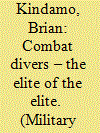

|
|
|
|
|
| Summary/Abstract |
Living and working on the sea can be difficult and dangerous. Working under the water can be even more unforgiving. Those who dare navigate under the waves, not just on top of them, to do what the army needs them to do are among the special forces' elite: combat divers.
|
|
|
|
|
|
|
|
|
|
|
|
|
|
|
|
| 2 |
ID:
133090
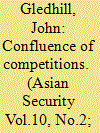

|
|
|
|
|
| Publication |
2014.
|
| Summary/Abstract |
In April 2006, riots broke out on the streets of Dili. As violence escalated over the weeks that followed, a beacon of liberal peace-building dissolved into near-anarchy. While there have been several accounts of Timor-Leste's "crisis" of 2006, it remains unclear why violence spiraled at that time, rather than at an earlier point in the country's post-conflict transition. This article addresses that temporal puzzle by combining an analysis of the structural origins of the crisis with discussion of proximate, agency-driven triggers to violence. The resulting narrative first details the development of competition between governing elites, and also between state security actors, over the years following independence. The fusion of those two dynamics of competition in 2006, I then argue, created conditions sufficient for violent conflict.
|
|
|
|
|
|
|
|
|
|
|
|
|
|
|
|
| 3 |
ID:
094161
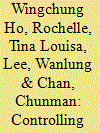

|
|
|
| 4 |
ID:
171190
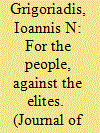

|
|
|
|
|
| Summary/Abstract |
While the rise of populism has been a global trend in recent years, it has been prevalent in Greece and Turkey for longer, leaving a strong imprint on the politics of both countries. Left-wing populism has become one of the constitutive elements of the Greek political party system since the collapse of the 1967–1974 military regime. The 2009 outbreak of the Greek economic crisis set the stage for the radicalization of Greek politics through the rise of extremist far-right and far-left populist parties that professed populist agendas of different hues. Such populists accused old-party personnel of being members of a “treacherous elite” that sacrificed Greek national interests against foreign powers. The 2011 “indignados” movement is key for the better understanding of the social dynamics that facilitated the rise of the unusual SYRIZA-ANEL coalition government. Debates on Greek constitutional reform also highlighted the relevance of populism, especially as the SYRIZA-ANEL government sought topics to resonate with its disenchanted voters. On the other hand, a right-wing populist rhetoric has been one of the key instruments for the rise of Turkish political Islam and the establishment of the AKP hegemony in Turkey. Establishing a Kulturkampf-based narrative about the “secularist, ‘white-Turk’ elites” versus the “conservative, ‘black-Turk’ people” was of great political significance. The constitutional reform process proved again crucial for manifesting the relevance of populism in Turkish political discourse. This article explores the circumstances under which left- and right-wing populism have emerged into a dominant feature of Greek and Turkish politics. It also discusses the decreasing relevance of the established left-right political divide in party politics and suggests alternative classifications.
|
|
|
|
|
|
|
|
|
|
|
|
|
|
|
|
| 5 |
ID:
181894
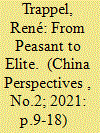

|
|
|
|
|
| Summary/Abstract |
This article contributes to the growing body of research on the role of the Party-state in shaping an emerging post-peasant modernity in rural China, taking developments in Gansu Province as a case. The article first analyses how a political preference for an agrarian elite has been put into recent policies and translates into rural practices. It argues that the “new-type agricultural management subjects,” (which form the core of this elite, should also be considered as a policy instrument designed to promote structural change in Chinese agriculture. This article proceeds to explore the capacity of the new agrarian elite as local development agents in Gansu Province. It focuses in particular on the legitimation of this instrument and its consequences for the structure of agriculture.
|
|
|
|
|
|
|
|
|
|
|
|
|
|
|
|
| 6 |
ID:
132975
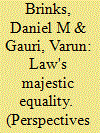

|
|
|
|
|
| Publication |
2014.
|
| Summary/Abstract |
While many find cause for optimism about the use of law and rights for progressive ends, the academic literature has long been skeptical that courts favor the poor. We show that, with the move toward a robust "new constitutionalism" of social and economic rights, the assumptions underlying the skepticism do not always hold. Our theories must account for variation in the elite bias of law and litigation. In particular, we need to pay closer attention to the broad, collective effects of legal mobilization, rather than focusing narrowly on the litigants and the direct benefits they receive. We support the claim by showing that litigation pursued in legal contexts that create the expectation of collective effects is more likely to avoid the potential anti-poor bias of courts. On the other hand, policy areas dominated by individual litigation and individualized effects are more likely to experience regressive outcomes. Using data on social and economic rights cases in four countries, we estimate the potential pro-poor impact of litigation by examining whether the poor are over- or under-represented among the beneficiaries of litigation. We find that the impact of courts is positive and very much pro-poor in India and South Africa, and slightly negative in Indonesia and Brazil. Overall, we challenge the tendency in the literature to focus on the direct effects of litigation, find that the results of litigation are more positive for the poor than the conventional wisdom would lead us to expect, and offer an explanation that accounts for part of the variation while raising a number of questions for future research.
|
|
|
|
|
|
|
|
|
|
|
|
|
|
|
|
| 7 |
ID:
146519
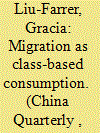

|
|
|
|
|
| Summary/Abstract |
Labelled as the third wave of migration out of post-reform China, the recent emigration of wealthy Chinese has attracted worldwide attention. Although this form of mobility involves primarily the richest 0.1 per cent of the Chinese population, the high profile of the people who move and the amount of wealth implied have made it a sensational social phenomenon. Through interviews, participant observation and media reports, this paper searches for the social meanings of this trend of emigration. Journalists generally attribute the exodus of the rich to a desire to secure their wealth, an aspiration for a different education for their children, or concerns with air pollution and food safety. What this paper argues is that underneath these stated motivations, emigration is in fact a form of class-based consumption, a strategy for class reproduction, and a way to convert economic resources into social status and prestige. “Emigration” (yimin), a form of mobility that may not entail settling abroad, is a path created by wealthy Chinese striving to be among the global elite.
|
|
|
|
|
|
|
|
|
|
|
|
|
|
|
|
| 8 |
ID:
123054
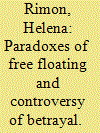

|
|
|
|
|
| Publication |
2013.
|
| Summary/Abstract |
Throughout the 1900s, intellectuals have been defined as a "privileged minority" (according to Chomsky), or as outsiders, whose "free floating" condition (Mannheim) guarantees their functioning as "custodians of values like reason and justice" (Hofstadter). Julien Benda accused intellectuals of betraying this mission. But, perhaps, betrayal is built into the very nature of their privileged position; perhaps, by pretending to be "free floating," generations of intellectuals have actually been constructing predictable paradigms, using calamity as a new kind of raw material for the old myth of lucrimax (Etkind). The tragic experience of Russian intellectuals provides us with fresh insight for this discussion.
|
|
|
|
|
|
|
|
|
|
|
|
|
|
|
|
| 9 |
ID:
124914
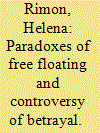

|
|
|
|
|
| Publication |
2013.
|
| Summary/Abstract |
Throughout the 1900s, intellectuals have been defined as a "privileged minority" (according to Chomsky), or as outsiders, whose "free floating" condition (Mannheim) guarantees their functioning as "custodians of values like reason and justice" (Hofstadter). Julien Benda accused intellectuals of betraying this mission. But, perhaps, betrayal is built into the very nature of their privileged position; perhaps, by pretending to be "free floating," generations of intellectuals have actually been constructing predictable paradigms, using calamity as a new kind of raw material for the old myth of lucrimax (Etkind). The tragic experience of Russian intellectuals provides us with fresh insight for this discussion.
|
|
|
|
|
|
|
|
|
|
|
|
|
|
|
|
| 10 |
ID:
117615
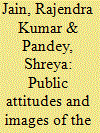

|
|
|
|
|
| Publication |
2012.
|
| Summary/Abstract |
This article seeks to fill a major gap in existing studies on how Asians perceive the European Union. It discusses the Union's efforts to promote its visibility in India since the mid-1990s and provides an overview of the Indian literati's perceptions of contemporary Europe. This article examines the perception, representation and visibility of the EU in the Indian media, among business, civil society and media 'elite' and in public opinion. It explores whether the Union's self-proclaimed representation as a global actor, a normative power and a leader in environmental negotiations conforms to how it is actually perceived in Third World countries. It evaluates whether more than a decade of summitry has led to greater visibility of the EU in the Indian media. The article concludes by making a comparison of EU imagery in media, elite and public opinion discourses, and makes several recommendations on how EU can possibly improve its visibility in future.
|
|
|
|
|
|
|
|
|
|
|
|
|
|
|
|
| 11 |
ID:
133032
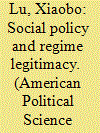

|
|
|
|
|
| Publication |
2014.
|
| Summary/Abstract |
Elites often use social policies to garner political support and ensure regime survival, but social policies are not a silver bullet. Using two waves of Chinese national surveys, I find that a recent policy of abolishing school fees has significantly increased citizens' demand for greater government responsibility in financing compulsory education. I argue that policy awareness, rather than policy benefits, drives citizens' demand. Finally, I show that policy awareness has enhanced citizens' trust in China's central government, but not in local governments. This asymmetry in regime support has two sources-the decentralization of education provision and biased media reporting-which induce citizens to credit the central government for good policy outcomes. Given that citizens' responses are primarily influenced by policy awareness that is promoted by the state media, this study casts doubt on the use of social policies to sustain long-term political support.
|
|
|
|
|
|
|
|
|
|
|
|
|
|
|
|
| 12 |
ID:
086965
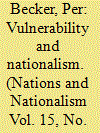

|
|
|
|
|
| Publication |
2009.
|
| Summary/Abstract |
This essay attempts to shed light on why aggressive ideas gain support within established western states. To do that it attempts to answer the question why the armed conflict against Iraq received such varied support during the first four months of 2003 within the United States, the United Kingdom, Australia, France and Spain. A comparative study indicates that the justifications for the armed conflict must be endorsed in the national identities of the particular states. If not, either the justifications or national identities have to be modified. The dominant elite emerge as essential to this process, as does the public experience of vulnerability. It appears that the war against Iraq received such varied support because the initial definitions of national identities endorsed the justifications for the war to different degrees, the dominant elites promoted different opinions and the people experienced different degrees of vulnerability.
|
|
|
|
|
|
|
|
|
|
|
|
|
|
|
|
|
|
|
|
|